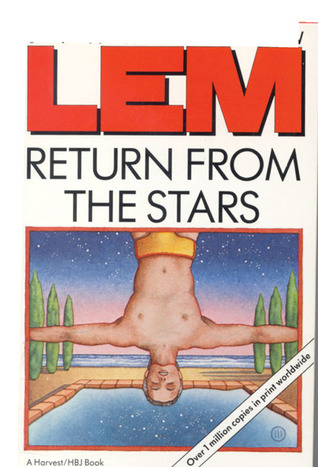Donald Barthelme calls Stanislaw Lem’s 1961 Return From the Stars “stunning,” according to the little front cover blurb on the edition I’ve got. That seems about right, though not quite in the way that Barthelme meant it.
The book’s about Hal Bregg, an astronaut who returns from distant stars having aged only 10 years while more than 100 years have passed on earth (thanks relativity!) The world has changed a lot, and he’s having trouble adjusting. As he says on the first page:
The bright colors of the women’s clothes I had by now learned to accept, but the men I still suspected, irrationally, of affectation….
That’s pretty much the whole novel there. The problem with the future is that it is terribly, frighteningly effeminate. The world has developed a process, betrization, which is performed on infants and effectively surgically castrates them — they cease being able to even formulate aggressive thoughts. It also apparently reduces their size (the feminine clothing is maybe an unrelated development.) Thus, Hal is cast into a decadent world where he’s the lone virile uber-masculine giant in a world of meek and tiny girly men — and meek and tiny girly women. And if anyone doubts that this is a total adolescent power fantasy, Hal’s uber-masculinity quickly seduces the world’s most beautiful movie star, who he discards in favor of another woman, Eri, who he kind of sort of rapes, but it’s all right because it turns out she likes it.
Lem’s a much-praised author, and this is one of his most-praised books, so you’re probably thinking there must be more to it than that. But nope; that’s all that’s on offer. Hal agonizes at this soft world without risk, performs manly exercise routines and drives dangerously to work off his stress, and wows the womanfolk, or stalks them — Lem doesn’t seem able to tell the difference. Risk and exploration are incessantly, obsessively figured as male (there were no women on Hal’s expedition, of course); home and hearth are just as obsessively figured as feminine, so that Hal’s decision to not go back into space is linked inevitably to his marriage to Eri, a character about whom we know nothing except that she finds the violent, whiny Hal unaccountably attractive (the book delicately suggests that this is because he’s such a good lay; betrization may prevent good sex too, maybe.)
Again, as Barthelme indicates, there is something “stunning” about the blatant idiocy of the gender politics. Sci-fi is almost as notorious as superhero comics for its bone-headed wish fulfillment, but even by the standards of Flash-Gordon-space-opera nonsense, Return from the Stars is eager to shove its virility under your nose. The main difference, and what makes this arty, I guess, is that most space opera revels in its protagonist’s power, whereas Lem coats his power-worship in philosophical hand-wringing (is a non-violent world worth abandoning the human spirit of adventure?!) and hypocritical self-pity (oh nos! I’m bigger and stronger than everyone on earth, and must fuck all the women! What ever will I do?) This is, in short, a dreadful, dishonest, sexist piece of crap, which manages to combine the worst aspects of male mid-life-crisis literary fiction with the worst aspects of stunted male adventure garbage. I’ve read some Lem books before that I’ve enjoyed, but this sure makes me not want to ever read another.

